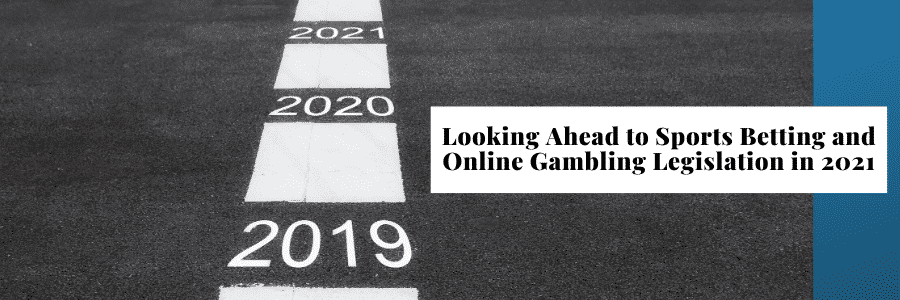US Sports Betting And Online Gambling Legislation: Looking Ahead To 2021

It took a global pandemic to derail US sports betting legalization efforts. But shut it down it did, and with virtually every state suspending their legislative sessions as the country is on lockdown, it’s unlikely any new legislation will pass this year.
The hope is a combination of herd immunity, effective treatments, and a vaccine for COVID-19 will help the world return to normal by next year, if not sooner. And when it does, sports betting, as well as other forms of gaming expansions, will once again be on the agendas of statehouses across the country.
COVID-19 Highlights the Need for Online Gambling
The closure of commercial and tribal casinos across the country have cut off a vital source of revenue for states, as have plummeting lottery sales.
However, that effect has been mitigated in markets with legal, regulated online gambling.
While states like California and New York saw casino revenue drop to zero, Pennsylvania and New Jersey operators have continued to send tax revenue to the state (albeit, far less than usual) thanks to online gambling.
Similarly, states with online lotteries have offset some of diminishing retail sales. With the country under stay-at-home advisories and people limiting their trips to essential needs, lottery sales have taken a severe hit. So much so, that multi-state drawings like Powerball have reduced the minimum increase between drawings from $10 million to $2 million.
But retailers in states like Michigan, with online lotteries, are considering selling lottery tickets exclusively online during the pandemic. And New Hampshire is reporting a 10% increase in sales from February to March.
And consider the following numbers from Jackpocket (an online lottery courier service available in seven states):
- 70% quarter-over-quarter sales growth in Q1 2020
- 44% increase in user registrations in Q1 2020
The difference between states with online lottery (either state-run or through Jackpocket) and online casino games and states with no legal online gambling options is stark. And legislatures across the country that have been reticent to legalize online gambling should take notice.
Here’s why every state should consider comprehensive legalization of online gambling products.
Most Online Products Compliment Their Retail Counterparts
For years, the main pushback against online gambling is it would cannibalize brick and mortar gaming. In states with legal online gambling, the opposite has proven true.
To an operator, New Jersey casinos are on the record as saying online gambling has not cannibalized their brick and mortar revenue. In fact, the reality of the situation is online gaming has helped AC casinos on every front:
- attract new, younger customers,
- reactivate lapsed customers, and
- increase the engagement of existing customers.
As the former head of the Tropicana online casino, Luisa Woods told Spectrum Gaming Group in 2017, “Not only was [brick-and-mortar customers’] online spend completely incremental, but they also grew their land-based spend.”
As the Spectrum Report states, “Technology did not alter social aspects of spectator sports or movie theaters,” the report states. “Technology will not alter social aspects of visiting brick-and-mortar casinos.”
Michigan’s experience with online lottery has been much the same. Cannibalization concerns haven’t come to fruition, and according to Michigan Lottery, retail sales have picked up since the state launched online lottery in 2014.
Strengthen and Future-Proof Existing Gambling
Online offerings will also prepare the gaming industry to adjust to changing customer dynamics. That can help the industry appeal to future generations and act as protection against another black swan incident like Coronavirus.
At the end of the day, online gambling provides operators with a new, additive revenue stream and the ability to connect with new customers, reconnect with old customers, and increase the value of existing customers. And as a bonus, it won’t be derailed by a weather event or a pandemic.
A Black Market Exists for All Of These Products
States concerned that the legalization of online poker, online casino, sports betting, or online lottery will cause an increase in problem gambling need to understand that it’s not a choice between having or not having online gambling. Instead, it’s a choice between regulated online gambling and unregulated online gambling.
Now, there’s evidence that legal online gambling casts a wider net, but there’s also evidence that the increased access doesn’t have a long-lasting effect on problem gambling rates.
As such, the choice is, do you want control over the online gambling operators in your state, or do you want to leave your residents at the mercy of black market operators?
Further, regulated gambling creates oversight and puts in place much-needed consumer protections. As such, states can help manage the social harms by earmarking a percentage of revenue towards research and problem gambling treatment.
Upshot
The writing has been on the wall for years. And now there is a spotlight being shone on it: States and the gaming industry need to embrace online gambling. And they need to do so in a responsible manner that mitigates the social harms while maximizing the economic benefits.







